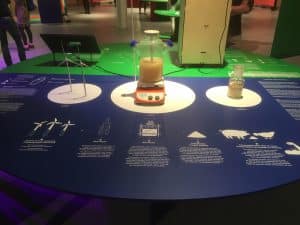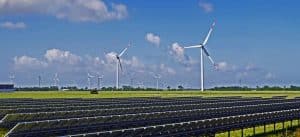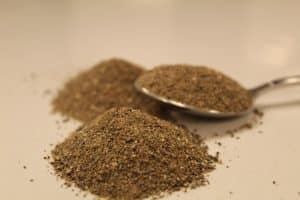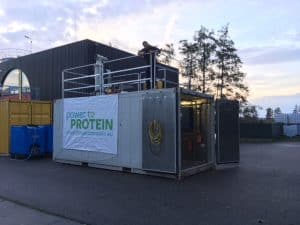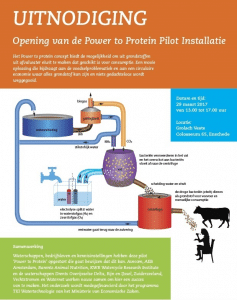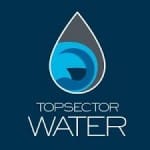
This website is co-financed with TKI-funding from the Topconsortia for Knowledge & Innovation (TKI’s) of the Ministry of Economic Affairs.
Facts about ammonia
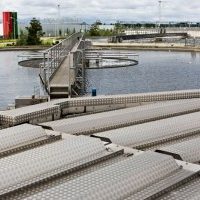
In Dutch sewage water treatment plants tens of thousands of tons of ammonia-nitrogen are destructed to nitrogen gas every year at the cost of 9 to 40 MJ/kg NH4-N (Annamox and conventional nitrification/denitrification respectively).
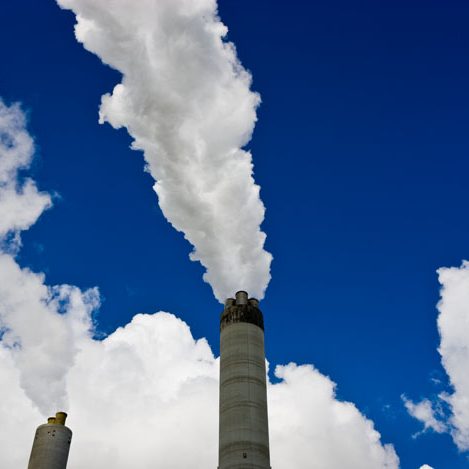
At the same time in fertilizer plants an even bigger amount of nitrogen gas is converted to ammonia in the Haber-Bosch process also at the cost of 45 MJ/kg NH4-N.
Power-to-Protein
Power-to-Protein is about closing this artificial nitrogen cycle by direct N upcycling as microbial protein.
The basis is a highly efficient microbial resynthesis process with a mixed culture of bacteria that use hydrogen as an energy source.
Idea holder and emeritus professor at Ghent University (LabMET), prof. dr. ir. Willy Verstraete states:
“The technology for recovery of reactive nitrogen as microbial protein is available but a change of mindset needs to be achieved to make such recovery acceptable.”
Together with its research partners KWR Watercycle research Institute investigates the technological, economic and environmental feasibility of the Power-to-Protein concept.
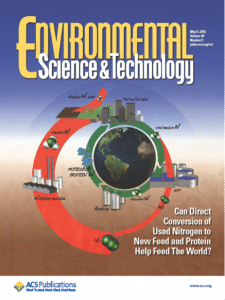
News and Updates
February 2022: Research on fundamentals of hydrogen transfer completed.
In this study, the aim was to gain fundamental insights into the mass transfer of hydrogen in bioreactors in order to promote the biosynthesis of single-cell protein. More specifically the study focuses on a bubble column reactor. The initiation of this study was based on the findings from the previous project phases (1 and 2).
July 2019: Power-to-Protein part of Future Food Exhibition at NEMO Amsterdam
In the exhibition Future Food at the NEMO Science Museum, visitors are taken on a future food journey. Plant, animal and functional food scenarios give visitors a glimpse into the future of insects, in-vitro meat, biotech, plant-based alternatives, alternative breeding methods, food as medicine and single cell proteins. The consortium that is working on the…
July 2018: Allied Waters Collab H2Bio further develops technology and markets for the power-to-protein concept
The Allied Waters Collab H2Bio will continue the work on the power-to-protein concept. The Collab focuses on biosynthesis of organic compounds – such as proteins – by bacteria using green hydrogen as an energy source. Allied Water is a public-private partnership dedicated to implementing innovations in the urban water cycle. The Collab is the main…
July 2018: first indications of in-vitro digestability of produced Single Cell Protein
The phase 2 Pilot Research is moving towards an end. The pilot studies have stopped and we have started evaluating the data from the tests. Meanwhile we had some material – that was produced during the pilot trial runs – analysed by an external laboratory. During the final campaign we produced the best dry single…
November 2017: Power-to-Protein pilot moved to SWTP Horstermeer (Amsterdam)
Both the Power-to-Protein Pilot and the Nijhuis Ammonia Recovery (NAR) pilot have been moved to the SWTP Horstermeer of Waternet. After start-up of the pilots in week 44, the focus in the next months will be on the production of larger amounts of microbial proteins. The aim is to produce at least 30 kg so that…
March 29 2017: Official opening of the Power-to-Protein Pilot
Invited guests from the waste water sector and food sector together with project partners and suppliers will join the official opening of the Power-to-Protein pilot at the SWTP in Enschede. Host is Mr. Jan van Hoek, member of the Executive Committee of Waterboard Vechtstromen and portfolio holder of Water Quality and Innovation. The quests will be informed about…
KWR Water Research Institute
Investigates, together with its research partners, the technological, economic and environmental feasibility of the 'Power-to-Protein' concept.


